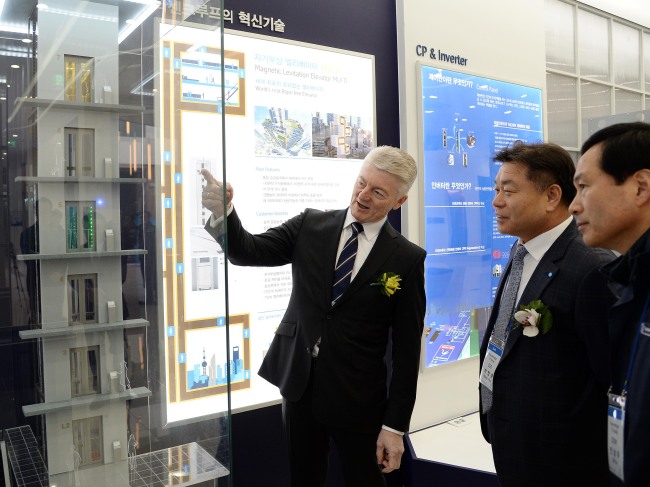CHEONAN, South Chungcheong Province - Thyssenkrupp, a leading German diversified industrial group, is looking to combine its engineering expertise with South Korean innovation to better address expanding urban infrastructural and mobility needs.
As a global industrial group adapting to digitalization and fast-paced urbanization, Thyssenkrupp views Korea as an important player with which it can build new technologies and foresee future developments, according to Heinrich Hiesinger, chief executive of Thyssenkrupp AG.
The German company seeks to “combine its engineering experience from across the globe with the strength of Korea’s innovation landscape to address emerging infrastructural and mobility needs in Korea.”

“For us, Korea is quite important,” Hiesinger told The Korea Herald after speaking at an event Tuesday at Thyssenkrupp Elevator Korea’s elevator production plant in Cheonan, South Chungcheong Province.
Thyssenkrupp is focusing mainly on elevator manufacturing and sales in Korea, with key partnerships in the automotive and steel segments such as those with POSCO and Hyundai Motor Group.
A full understanding of what is happening in Korea, which is often a “good early adapter” and a “technology frontrunner,” leads to knowledge of what might happen in other countries,” which applies to all of Thyssenkrupp’s businesses, Hiesinger said.
Highlighting the fast-paced expansion of cities and the growing need to transform urban infrastructure to drive up efficiency, the Thyssenkrupp CEO said the firm is working to revolutionize the world’s elevator systems.
The most promising elevator system to watch this year is Thyssenkrupp’s magnetic levitation elevator MULTI, the world’s first ever rope-free elevator. Heisinger said three prototypes will be unveiled at the company’s new test tower in Rotteweil, Germany, later this year.
As a “reinvention of the elevator concept,” which has remained largely unchanged for the past 160 years, MULTI is set to revolutionize elevator design and future mobility by enabling highly-efficient circulation and horizontal movement, he said.
The German firm also highlighted a range of exclusive, cutting-edge elevator technologies at the Cheonan plant, including SMART, a remote elevator monitoring and maintenance solution powered by IoT technology, and TWIN, an elevator system that enables two cabins to operate independently inside a single shaft, improving space usage and operational efficiency.
Thanks to an investment of about 15 million euros ($2.4 billion) into new technologies and innovation over the past five years, Thyssenkrupp Elevator Korea recorded a 20 percent year-on-year growth in 2015, compared to the market average of 8 percent, to become the No. 2 elevator company in Korea.
This year, the firm also plans to pour in tens of millions of dollars into automating its operations and building a new components warehouse at its Cheonan plant.
As a group, Thyssenkrupp is looking to further scale up its R&D globally this year, after having spent some 735 million euros in 2015, up 4 percent from the previous year.
By Sohn Ji-young (jys@heraldcorp.com)



![[Herald Interview] 'Amid aging population, Korea to invite more young professionals from overseas'](http://res.heraldm.com/phpwas/restmb_idxmake.php?idx=644&simg=/content/image/2024/04/24/20240424050844_0.jpg&u=20240424200058)














![[Today’s K-pop] Kep1er to disband after 2 1/2 years: report](http://res.heraldm.com/phpwas/restmb_idxmake.php?idx=642&simg=/content/image/2024/04/25/20240425050792_0.jpg&u=)